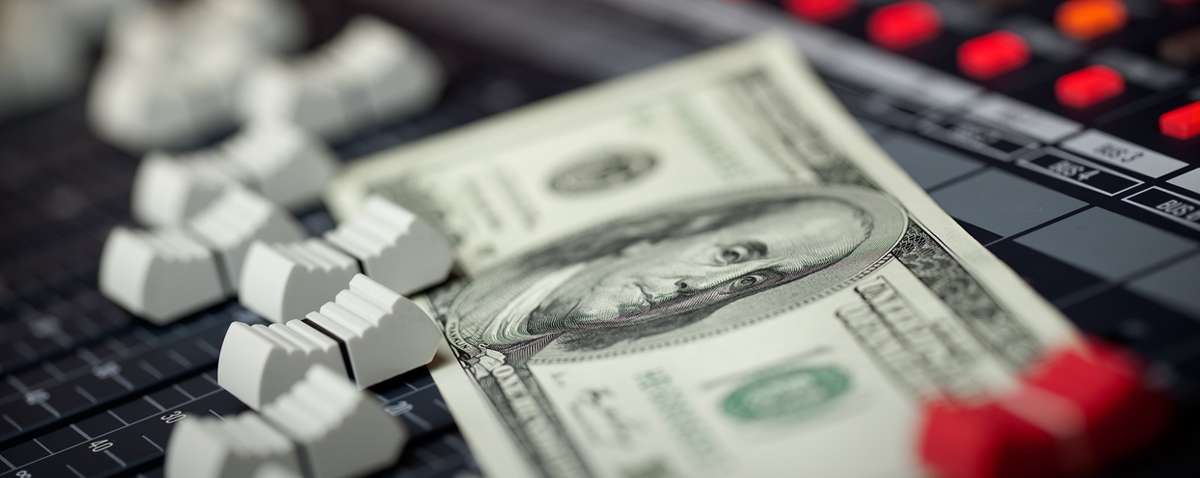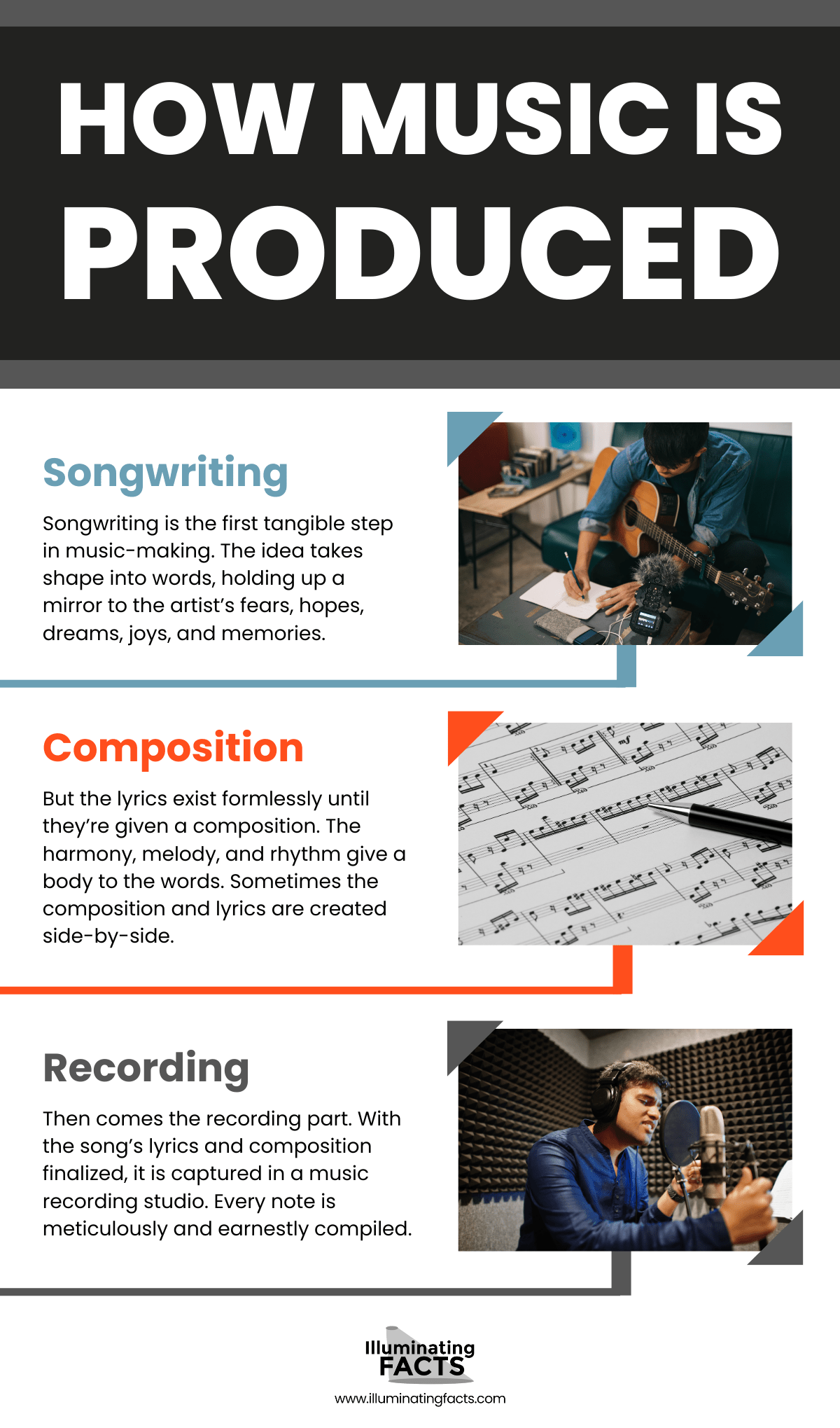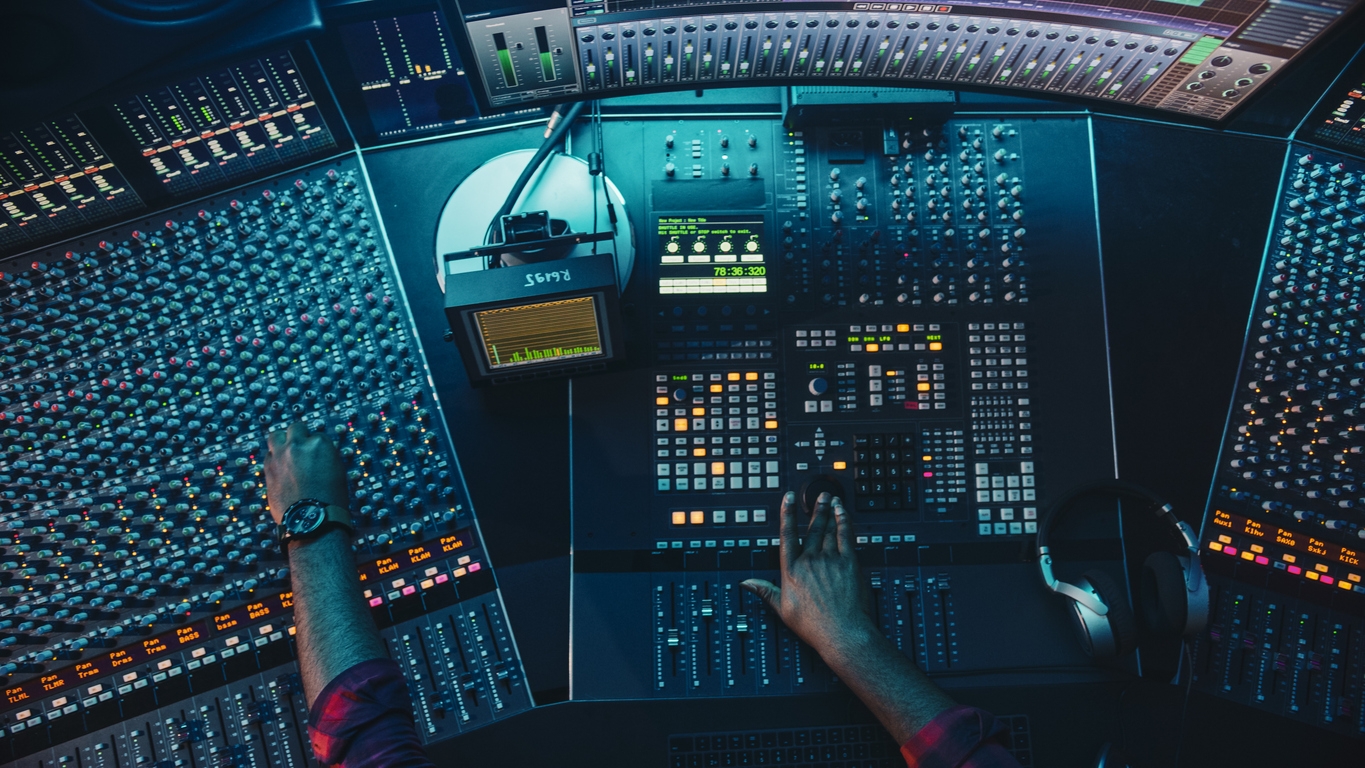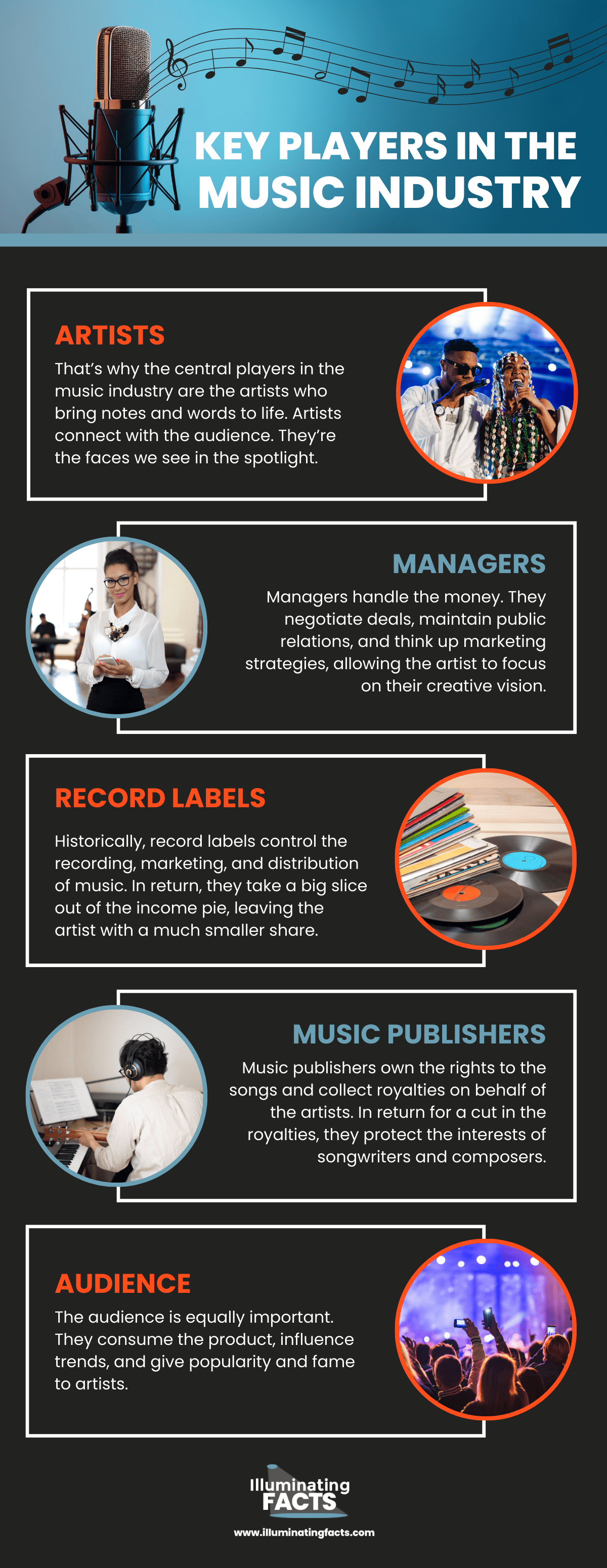Melodies and Money: Exploring the Business of Music
The music industry is where business and art meet. It’s an industry that takes recordings from quiet studios to listeners everywhere in the world. An elaborate system makes that possible.
Music is about making a pleasing song. But that’s not all it’s about. Professional artists need to sell their music too. It’s the only way they can keep making more music. The music industry is a marketplace, complete with its economy of product and profit. It is a layered system of networks and processes — one that we’ll unfold in this post.
It’s often overlooked, but understanding the intersection of business and music is crucial for artists. A fisherman needs to know how to catch fish, yes. But he also needs to learn how to sell them. Artists have to keep an eye on the market and settle into it so they can sustain their work. In this way, the business side of things becomes just as important as making a catchy melody.
In our exploration of the music industry, we’ll journey through the vast ocean that is the modern music industry. We’ll learn some music industry facts, how songs are made, the selling and marketing facets, the key people involved, and the future of the industry. It’s an intriguing and dynamic world.
How Music is Produced
A song is far more than just a collection of notes. It starts its life in the thoughts, emotions, and experiences of the artist. They act as the raw material for songwriting.
Songwriting
Songwriting is the first tangible step in music-making [1]. The idea takes shape into words, holding up a mirror to the artist’s fears, hopes, dreams, joys, and memories. The words penned tell a narrative, carry a message, and embody the essence or soul of a song.
Composition
But the lyrics exist formlessly until they’re given a composition [2]. The harmony, melody, and rhythm give a body to the words. Sometimes the composition and lyrics are created side-by-side. But whatever the order may be, the two elements are inseparable. The composition makes a song distinctive and gives it a unique tune. The “Bohemian Rhapsody” by Queen has an amazingly intricate and unpredictable musical composition. A mish-mash of styles, it’s meant to reflect the equally chaotic and complex nature of the lyrics. On the other hand, “Hallelujah” by Leonard Cohen has a simple, calming composition to direct the listener’s attention to the lyrics of love, loss, and faith — the true heart of the song.
Recording
Then comes the recording part [3]. With the song’s lyrics and composition finalized, it is captured in a music recording studio. Every note is meticulously and earnestly compiled. But it’s not ready for the listener. The first recording is raw and unrefined. It’s later polished into the final version that reaches your ears. That’s how a song is born.
From the echoes in the artist’s mind, the vision slowly takes shape until it’s recorded in a studio and turned into the final product. Although the process is identical, each song stands apart from the next. The artist’s creativity and expression are imprinted on the song — much like a fingerprint. But it’s far from static. The world of music is always changing and evolving.
Evolution of Music
Genres rise, meld into others, and transform. Cultural movements, political events, and societal norms dictate the shape of the music industry. Just as the counterculture movement was gaining ground, rock and pop music from the United Kingdom became popular in the United States.
Their music featured themes of anti-establishment and rebellion. It was later called the British Invasion of the 1960s [4]. But how did the British Invasion affect American music? Put simply, it reshaped the music scene in America. The Beatles, The Rolling Stones, and the like popularized fresh styles. The influence went beyond one or two genres, involving the entire music industry in the United States.
The Money
At the end of the magical process of music-making, the artist has the finished, polished song ready for the audience. But creation is only the first of the many steps. And money is at the center of it all. The artist’s song serves as the product. It’s bought and sold in the marketplace. And anyone venturing into the music industry needs to understand its commercial aspect to navigate it.
Promotion and Marketing
At the end of music production comes promotion and marketing. Independent artists have to promote their music themselves. But music labels typically handle it for a share in the revenue. Music videos, teasers, promotional singles, social media, press releases, and radio generate buzz around the upcoming song or album.
With some marketing momentum going, the song or album enters distribution. Once distribution was physical; the physical albums would appear on racks in brick-and-mortar stores. But music distribution today doesn’t take more than a click on a streaming platform like Spotify or Apple Music.
Music Sales
Traditionally, each album sold represented a measure of the revenue. But music sales come in all shapes and sizes now — albums, singles, downloads, and streaming. Streaming platforms, like Spotify and Apple Music, have forever changed how we consume music [5]. Listeners pay a subscription fee and get access to the platform’s entire music catalog, which features millions of songs. Every time you stream a song, the artist gets a fraction of a cent. The rate may seem insignificant, but it adds up.
The revenue from all these sources fuels the music industry.
But not all of it makes it into the artist’s pocket. Instead, the proceeds are shared among record labels, distributors, and many other players (more on that in a few). If you’re looking for hard numbers and figures, check out our rundown of the music industry by the numbers.
Then, there’s live music. Other than music sales, concerts, and tours are the primary source of income for artists. They get revenue from tickets, merchandise, and sponsorships. And the audience gets an immersive, delightful listening experience that’s not found in streaming.
Key Players in the Music Industry
The business of music fuses commerce with art and pragmatism with creativity. Although it is the lifeblood of the industry, money isn’t and shouldn’t be the end goal. Money makes music possible. And it ensures that the songs never stop coming.
Artists
That’s why the central players in the music industry are the artists who bring notes and words to life. Artists connect with the audience. They’re the faces we see in the spotlight.
But an artist (unless they’re independent) isn’t a lone wolf. They work and collaborate with a whole team [6]. Most often, they work closely with a producer to shape and refine a song. Producers handle the technical end of production, assisting the artist behind the scenes.
Managers
Managers handle the money. They negotiate deals, maintain public relations, and think up marketing strategies, allowing the artist to focus on their creative vision. By acting as their advocate and liaison, a manager steers the artist’s career and helps them navigate the complex industry.
Record labels
Historically, record labels control the recording, marketing, and distribution of music. In return, they take a big slice out of the income pie, leaving the artist with a much smaller share. But with modern platforms like Spotify, artists can take out the middlemen and self-publish their work. They can also ask fans to crowdfund their projects. It strengthens the connection between the artist and the audience because they get a small stake in the artist’s work.
Streaming platforms are the new major players in the industry. They’ve revolutionized how we consume music and how artists generate revenue.
Music Publishers
Music publishers own the rights to the songs and collect royalties on behalf of the artists. In return for a cut in the royalties, they protect the interests of songwriters and composers, by ensuring the artists are compensated fairly for their work.
Audience
The audience is equally important. They consume the product, influence trends, and give popularity and fame to artists.
How Technology Shapes Music
Just as the technology of streaming platforms redefined how we consume and distribute music, the future of the music industry will also change with new innovations.
Emerging technologies like artificial intelligence (AI) and virtual reality (VR) are already making waves in the music industry. AI is transforming the creation and consumption of music. Composers are using it to assist in the production. AI algorithms are delivering more personalized music recommendations to listeners, helping them discover more of what they love.
Virtual concerts, live streams, and interactive performances can’t deliver the collective energy and the physical tactility of a live concert. But virtual reality (VR) is helping artists create a more immersive music experience that can’t be replicated with streaming. Although far from the real thing, it still augments and adds to the listening experience. Fans can attend virtual concerts and interact with the music in virtual worlds. Artists like Ariana Grande, Travis Scott, and Post Malone have already performed for millions in VR concerts [7].
Technology is also empowering new artists. With digital platforms, independent artists can self-publish without aid from record labels. They also claim a larger share of the profits. And reach a wide audience.
Conclusion
Through our exploration of the music industry, we’ve discovered the intricate interplay of melodies and money. We covered the creative production process, examined the business aspect, noted key players in the industry, and touched on the role of emerging technology in the future of music.
The music industry is always shifting, changing, and evolving. And that flux moves with technology, cultural trends, and consumer tastes. The blend of art, commerce, and technology that powers the music industry will continue to change.
References
[1] How to Compose Music. (n.d.). Art of Composing. Retrieved June 27, 2023, from https://www.artofcomposing.com/how-to-compose-music-101
[2] Landeau, S. (2023, April 4). How to Record a Song: Gear and Steps to Get Started – 42West. Adorama. Retrieved June 27, 2023, from https://www.adorama.com/alc/how-to-record-a-song/
[3] Leviatan, Y. (2017, July 27). Making Music: The 6 Stages of Music Production | Waves. Waves Audio. Retrieved June 27, 2023, from https://www.waves.com/six-stages-of-music-production
[4] Paese, M. (n.d.). British Invasion. The History of Rock and Roll Radio Show. Retrieved June 27, 2023, from https://thehistoryofrockandroll.net/british-invasion/
[5] Phillips, P., & Surmani, A. (n.d.). Key Players in the Music Industry – Music Impact Network. – Music Impact Network. Retrieved June 27, 2023, from https://musicimpactnetwork.org/key-players-in-the-music-industry
[6] Vives, X., Wikström, P., & Castronova, E. (n.d.). The Music Industry in an Age of Digital Distribution | OpenMind. BBVA Openmind. Retrieved June 27, 2023, from https://www.bbvaopenmind.com/en/articles/the-music-industry-in-an-age-of-digital-distribution/
[7] VR Concerts; Virtual Reality Concert Apps & Examples. (2023, April 4). Metamandrill.com. Retrieved June 27, 2023, from https://metamandrill.com/vr-concerts/






